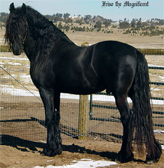Equine winter care is important for a healthy horse. While the outdoor temperatures prove to be less than desirable for you and I, our horses are much better equipped for the weather than we are. However, your horse still requires assistance in maintaining and/or increasing their own body temperature and basic care to keep them healthy and free from injuries. Understanding when this is a need can be tricky, but solutions are fairly simple. Each horse has a different set of requirements based on their age, hair coat and body weight, but here are some important equine winter care basics.
Food Cold temperatures will increase a horse’s energy requirement as the need to maintain their core body temperature increases. Increasing the horses caloric intake will help your horse increase its body temperature. Increase about 1% for each degree below 18°F. For example, if the temperature is 0°F, a 1,000 pound idle, adult horse would need an approximately 2 additional pounds of forage daily. It is best to provide the extra energy as forage. Some believe that feeding more grain will help keep a horse warmer. However, not as much heat is produced as a by-product of digestion, absorption, and utilization of grain as is produced from the microbial fermentation of forage. Most data suggest that the need for other nutrients do not change during cold weather. However, consider feeding loose salt instead of block salt, as horses may not want to lick cold salt blocks during winter months.
Water Snow and Ice are not adequate water sources for horses. There have been a few scientific studies done that show that horses who have acclimated to winter weather conditions (wild horses) can meet their water intake needs with ice and snow, but it is not recommended for domestic horses because of the risks of severe health problems during the adjustment period. Keeping a heated water tank is a recommended solution to keep ice at bay during cold winter weather.
Shelter A horses hair coat acts as an insulator by trapping air. When wet, or caked with mud it reduces it’s insulating value and increasing heat loss. Keeping your horse clean and dry is an important factor in maintaining their body temperature. Horses should always have access to shelter from wind, sleet and storms. Free access to stables, an open-sided shed or trees also provide shelter if a building isn’t available. If shelter isn’t available during turn out periods, and the wind chill is below 5 F, there is a risk of your horse becoming wet. Age also plays a factor. If they are really old or really young, blanketing your horse is highly recommended. When choosing to blanket, please make sure the blankets properly fit preventing sores from the blanket improperly rubbing. Remove blankets, check for moisture and reposition them on a daily basis.
Hoof Care While horses hooves tend to grow slower during the winter months, their hooves should still be trimmed every 6 – 12 weeks. Timing completely depends on the hoof growing trends of each horse. Horse hooves are however very susceptible to collecting ice or snowballs within their hooves increasing the risk of slipping. These snowballs can also increase pressure on tendons and joints or cause sole bruising. Horses hooves should be checked and picked out daily especially after a heavy snowfall.
Exercise It is extremely important to work your horse and provide adequate exercise over the winter months. Keeping them confined has health risks of its own, so being able to provide turnout time is an essential part of winter care. When riding your horse in the winter months, stay mindful of heavy wet snows, ice and slippery paths for both the rider and the horses’ safety. Exercise obviously causes an amount of sweat. Keeping your horse dry so that they are not left in a cold barn while wet, is extremely important. There are various types of clipping techniques that can be used. Clipped horses do have higher energy needs and should be fed accordingly.
Vitamin E Vitamin E is the number one antioxidant in the body. Horses do not naturally make Vitamin E. Vitamin E is required to maintain the right blood and tissue levels to help protect cells. In order to function properly, nerve tissues especially require Vitamin E. Regular outside exposure is required to maintain the correct levels. Fresh forage has a good amount of Vitamin E, but requires about 12 hours a day of grazing to obtain the needed amount. It’s even harder to reach that required level in the winter months especially if the ground is frozen or snow covered. Horses that are not able to graze for more than a couple hours a day, have teeth issues or are regularly on dirt floors are deficient in Vitamin E and should receive supplements. Equine Medical and Surgical Associates are here to help you provide the correct amount of Vitamin E to your horse. Click HERE for your Free Veterinary Consult or HERE for more information on our Vitamin E Supplement. Or visit www.equinemedsurg.com for more information on caring for your horse!







; ?>/wp-content/themes/twentyten/img/NMImacLogo_150.jpg)






